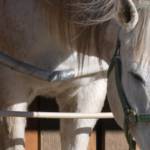Feeding Horses with Neurologic Disease

The main goals of feeding horses with neurologic disease are to supplement vitamin E and ensure that horses continue eating a good-quality, balanced diet. Many horses with neurologic disease will have impaired balance and gait abnormalities that will prevent them from being turned out. If safe for the horse and handlers, some hand-grazing allows access to fresh grass and serves as physical therapy for the horse.
Horses with neurologic disease often have trouble balancing, especially when they lower their heads. Feeding hay in hay nets or placing feed on top of a straw bale makes it easier for neurologic horses to eat. These horses are sometimes reluctant to move around their stalls, so it is important to keep hay, feed, and water near each other if the horse has difficulty moving around. Some treatments for equine protozoal myeloencephalitis (EPM) such as sulfonamides and pyrimethamine may cause gastrointestinal upset, so it is very important to keep the horse eating and potentially supplement with probiotics to reduce the chances of developing diarrhea.
Several equine neurologic diseases, such as neuroaxonal dystrophy, equine degenerative myelopathy, and equine motor neuron disease, have been shown to be caused by vitamin E deficiency or to improve with vitamin E supplementation. Many veterinarians prescribe vitamin E supplementation for the treatment of equine neurologic diseases because of its neuroprotective effects. The usual recommended dose of micellized natural vitamin E (water-soluble d-α-tocopherol) for horses with neurologic disease is 5,000-10,000 IU by mouth every 24 hours. This is approximately 10-20 times the dietary requirement for an 1100-pound (500-kg) horse.
Treatment of EPM with sulfonamide antibiotics and pyrimethamine is still an effective and often prescribed therapy. These drugs interfere with folate metabolism in protozoa. Folate is eventually converted to active tetrahydrofolate, which is important for DNA synthesis and in rapidly growing tissues. Horses absorb folate from their diet, whereas microorganisms must produce their own. Horses eating fresh forages have higher serum folate concentrations than horses fed other feedstuffs. Folic acid supplementation for horses with EPM being treated with sulfonamide antibiotics and pyrimethamine has been shown to be detrimental and may cause clinical signs of folate deficiency and lead to birth defects in foals from treated mares. It is believed that supplemental folic acid competes for absorption with active tetrahydrofolate and actually creates or worsens a folate deficiency.








